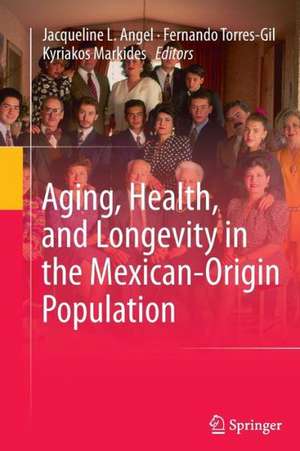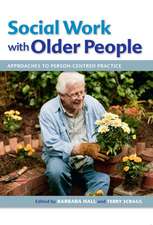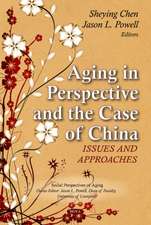Aging, Health, and Longevity in the Mexican-Origin Population
Editat de Jacqueline L. Angel, Fernando Torres-Gil, Kyriakos Markidesen Limba Engleză Paperback – 16 apr 2014
| Toate formatele și edițiile | Preț | Express |
|---|---|---|
| Paperback (1) | 644.95 lei 6-8 săpt. | |
| Springer – 16 apr 2014 | 644.95 lei 6-8 săpt. | |
| Hardback (1) | 648.24 lei 6-8 săpt. | |
| Springer – 9 feb 2012 | 648.24 lei 6-8 săpt. |
Preț: 644.95 lei
Preț vechi: 758.77 lei
-15% Nou
Puncte Express: 967
Preț estimativ în valută:
123.41€ • 128.85$ • 102.14£
123.41€ • 128.85$ • 102.14£
Carte tipărită la comandă
Livrare economică 04-18 aprilie
Preluare comenzi: 021 569.72.76
Specificații
ISBN-13: 9781489997920
ISBN-10: 148999792X
Pagini: 376
Ilustrații: XXVIII, 348 p.
Dimensiuni: 155 x 235 x 20 mm
Greutate: 0.54 kg
Ediția:2012
Editura: Springer
Colecția Springer
Locul publicării:New York, NY, United States
ISBN-10: 148999792X
Pagini: 376
Ilustrații: XXVIII, 348 p.
Dimensiuni: 155 x 235 x 20 mm
Greutate: 0.54 kg
Ediția:2012
Editura: Springer
Colecția Springer
Locul publicării:New York, NY, United States
Public țintă
ResearchCuprins
Preface and Acknowledgement.-About the Authors .-Forewords
1. Introduction.-Section 1- Latino Aging: Risks of Disability and Chronic Illness.- 2. Overview .-3. Does the “Healthy Immigrant Effect” Extend to Cognitive Aging?.-4. Lifetime Socioeconomic Position and Functional Decline in Older Mexican Americans: Results from the Sacramento Area Latino Study on Aging.-5. Cultural Differences in the Effects of Disability on Mental Health in Mexican Couples from the MHAS and MA Couples from the H-EPESE.-6.Disability: Issues of Immigration, Economics, and Family .-7. Overview.-8. A Tale of Three Paradoxes: The Weak Socioeconomic Gradients in Health among Latino Immigrants and their Relation to the Latino Health Paradox and Negative Acculturation.-9. On the Need for Prospective Studies on Aging and Health of the Hispanic Population in .-10. Sociocultural Status and Burden of Disability in Aging Mexican Americans.-11. Contextualizing the Burden of Chronic Disease: Diabetes, Mortality and Disability in Older Mexicans.-12. Access to Vaccines for Latin American and Caribbean Older Adults with Disability .-13. Diabetes and Employment Productivity: The Effect of Duration and Management among Mexican Americans.- Section 3. Caregiving and Long-term Care of Older Latinos: Formal and Informal Care Arrangements .-14. Overview15. Latinos “Aging in Place”: Issues and Potential Solutions.-16. Separate and Unequal Access and Quality of Care in Nursing Homes: Transformation of the Long Term Care Industry and Implications of the Research Program for Aging Latinos/-17. Latino and Non-Latino Elderly in Los Angeles County: A Pilot Study of Demographic Trends for Disability and Long-Term Care.-18. Long-Term Care Policy and Older Latinos
.-19. Estimating the Demand forLong-term Care among Aging in Mexican-Americans: Cultural Preferences versus Economic Realities.-20. Mexican-American Families and Dementia: An Exploration of “Work” in Response to Dementia-Related Aggressive Behavior.-21. Caring for the Elderly: A Bi-national Task .-22. Extending Medicare to Mexico: Impact on Mexican-Born Beneficiaries/-23. The Evolving Nexus of Policy, Longevity and Diversity: Agenda Setting for Latino Health and Aging.-
24. Afterword: Human Security in Health: The Case of the Mexico–U.S. Border.
1. Introduction.-Section 1- Latino Aging: Risks of Disability and Chronic Illness.- 2. Overview .-3. Does the “Healthy Immigrant Effect” Extend to Cognitive Aging?.-4. Lifetime Socioeconomic Position and Functional Decline in Older Mexican Americans: Results from the Sacramento Area Latino Study on Aging.-5. Cultural Differences in the Effects of Disability on Mental Health in Mexican Couples from the MHAS and MA Couples from the H-EPESE.-6.Disability: Issues of Immigration, Economics, and Family .-7. Overview.-8. A Tale of Three Paradoxes: The Weak Socioeconomic Gradients in Health among Latino Immigrants and their Relation to the Latino Health Paradox and Negative Acculturation.-9. On the Need for Prospective Studies on Aging and Health of the Hispanic Population in .-10. Sociocultural Status and Burden of Disability in Aging Mexican Americans.-11. Contextualizing the Burden of Chronic Disease: Diabetes, Mortality and Disability in Older Mexicans.-12. Access to Vaccines for Latin American and Caribbean Older Adults with Disability .-13. Diabetes and Employment Productivity: The Effect of Duration and Management among Mexican Americans.- Section 3. Caregiving and Long-term Care of Older Latinos: Formal and Informal Care Arrangements .-14. Overview15. Latinos “Aging in Place”: Issues and Potential Solutions.-16. Separate and Unequal Access and Quality of Care in Nursing Homes: Transformation of the Long Term Care Industry and Implications of the Research Program for Aging Latinos/-17. Latino and Non-Latino Elderly in Los Angeles County: A Pilot Study of Demographic Trends for Disability and Long-Term Care.-18. Long-Term Care Policy and Older Latinos
.-19. Estimating the Demand forLong-term Care among Aging in Mexican-Americans: Cultural Preferences versus Economic Realities.-20. Mexican-American Families and Dementia: An Exploration of “Work” in Response to Dementia-Related Aggressive Behavior.-21. Caring for the Elderly: A Bi-national Task .-22. Extending Medicare to Mexico: Impact on Mexican-Born Beneficiaries/-23. The Evolving Nexus of Policy, Longevity and Diversity: Agenda Setting for Latino Health and Aging.-
24. Afterword: Human Security in Health: The Case of the Mexico–U.S. Border.
Textul de pe ultima copertă
As the nation’s largest Latino group, the Mexican-origin population will play a major role as America grows older: their situation is vital to understanding our aging, diverse society as national health care policy comes into a new era of analysis and revision.
Aging, Health, and Longevity in the Mexican Origin Population identifies current and emerging health issues affecting this demographic, from health care disparities to changing family dynamics to the health implications of the United States’ relationship with Mexico. Contributors test the Hispanic Paradox—that Latinos live longer than other Americans despite socioeconomic stresses—as it relates to various aspects of aging. Disability is discussed in social context, in terms of acculturation, family coping measures, access to care, and other key factors. And concluding chapters offer strategies for bringing the Mexican-American elder experience into the ongoing debate over health care. Throughout, coverage balances the heterogeneity of the community with its status as emblematic of minority aging and as a microcosm of aging in general. Included among the topics:
· Immigration, economics, and family: contextualizing disability.
· Diabetes and employment productivity.
· The “healthy immigrant effect” and cognitive aging.
· Nursing home care: separate and unequal.
· Challenges of aging in place.
· Estimating the demand for long-term care.
Aging, Health, and Longevity in the Mexican Origin Population brings issues, answers, and a clear direction to those studying and working with this dynamic group, including policymakers, social workers, gerontologists, the academic and research communities, and health care professionals.
Aging, Health, and Longevity in the Mexican Origin Population identifies current and emerging health issues affecting this demographic, from health care disparities to changing family dynamics to the health implications of the United States’ relationship with Mexico. Contributors test the Hispanic Paradox—that Latinos live longer than other Americans despite socioeconomic stresses—as it relates to various aspects of aging. Disability is discussed in social context, in terms of acculturation, family coping measures, access to care, and other key factors. And concluding chapters offer strategies for bringing the Mexican-American elder experience into the ongoing debate over health care. Throughout, coverage balances the heterogeneity of the community with its status as emblematic of minority aging and as a microcosm of aging in general. Included among the topics:
· Immigration, economics, and family: contextualizing disability.
· Diabetes and employment productivity.
· The “healthy immigrant effect” and cognitive aging.
· Nursing home care: separate and unequal.
· Challenges of aging in place.
· Estimating the demand for long-term care.
Aging, Health, and Longevity in the Mexican Origin Population brings issues, answers, and a clear direction to those studying and working with this dynamic group, including policymakers, social workers, gerontologists, the academic and research communities, and health care professionals.
Caracteristici
deals directly with the concepts of diversity, social structure, and health inequality in the context of global population change represents a key source of information for nongovernmental organizations advocating for Latino health, health care policy, immigration research includes material that address important issues related to the contemporary political debate on immigration and health care reform in the United States and in Mexico Includes supplementary material: sn.pub/extras















